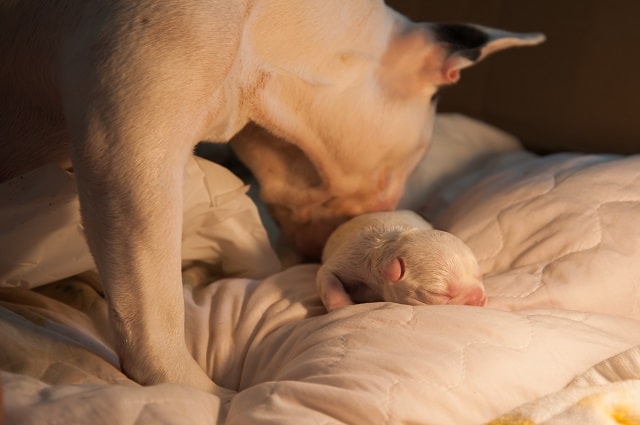How many litters can a french bulldog have: Breeders of French Bulldogs should not breed their dogs more than three times in their lifetime and no more than once every 18 months at the very least.
It is common for pregnant French Bulldogs to be unable to give birth naturally because their puppies have wide heads and shoulders that prevent them from passing through the birth canal easily. It is normal for French Bulldog puppies to be born by C-section at a veterinary clinic. The following information is crucial if you intend to breed your French Bulldog.
Importance of understanding litters in French Bulldogs
Understanding litters in French Bulldogs is important for several reasons:
- Health Concerns: French Bulldogs have a small gene pool and are prone to certain health issues such as breathing problems, skin allergies and eye problems. Knowing the average litter size and potential health issues of a French Bulldog can help owners prepare for and prevent any potential health problems.
- Financial Planning: Breeding and raising a French Bulldog litter can be expensive and requires careful financial planning. Knowing the average litter size and associated costs can help owners determine if breeding is a financially viable option for them.
- Responsible Breeding: French Bulldogs are a popular breed, and responsible breeding practices are important to ensure the health and well-being of the breed. Understanding litters helps owners make informed breeding decisions and can help prevent overpopulation and inbreeding.
- Proper Planning: Planning for a litter involves more than just deciding to breed your French Bulldog. Proper planning involves the preparation of the mother and puppies, the preparation of the breeding environment, and ensuring that adequate resources are available to care for the litter properly. Understanding litter helps owners plan and prepare properly.
What is so difficult about breeding French Bulldogs?
The traits and characteristics that make a French Bulldog so popular can also be the ones that cause problems with breeding them. Looking at a French Bulldog, it might not be immediately evident what can cause problems.
When fully grown, a female French Bulldog rarely weighs more than 28 pounds. Due to their broad heads and chests, these dogs are typically larger than their hindquarters, so their puppies usually don’t fit easily into their birth canals. This means in most cases. They are subjected to c-sections (cesareans).
French Bulldog litters are typically born via veterinarian-assisted cesarean section in up to 80 percent of cases. Despite the risks associated with C-sections for dogs, especially those with brachycephalic short muzzle shapes such as the French Bulldog, they are considered a safer way to deliver puppies than letting the French Bulldog deliver naturally.
Further, the Royal Veterinary College states that French Bulldogs have a 16 percent higher risk of suffering difficult or dangerous births.
Having your Frenchie has too many C-sections is completely irresponsible if you intend to breed your dog. You run the following risks:
| A C-section is not always successful, and there is a risk to the puppies during the procedure. |
| Following a C-section, your French Bulldog can become stressed and perhaps even aggressive. An excessive number of procedures could worsen your dog’s mental state. |
| A negative reaction to anesthesia, blood clotting during surgery, hemorrhaging, or wound infection are all possible complications for your French Bulldog. |
Your French Bulldog must be well cared for post-pregnancy, including at birth and while nursing. Being a mother and giving birth are emotionally and physically demanding times.
Aside from the scarring from the C-section, your female will need time to recover from giving birth to a litter. Additionally, she will have to re-grow parts of her uterus and strengthen her muscles.
Early in pregnancy, many females experience muscle wasting and even fur loss. Frenchies should only be bred every 18 to 24 months, allowing them enough time to recover from their surgeries.
How many litters can a French Bulldog have per year?
How many litters can a french bulldog have in a year: Even though a healthy French Bulldog should be able to produce litter at every heat, it doesn’t mean it is safe. Because of this, the female Frenchie needs to recuperate after giving birth. She may have come into heat, but that does not mean her body is ready to carry a litter so soon.
As I mentioned earlier, French Bulldogs should only be bred every 18 months to 2 years. The longer we wait, the greater her chance of recovering, being healthy, and being happy without the constant stress of frequent C-sections.
What Is The Best Age to Start Breeding a French Bulldog
The age at which a female dog goes into heat varies depending on the breed size. You should not plan to breed your dog until at least her second or third heat. The third heat is a good time to begin breeding for a few reasons.
| The health of a young dog can be negatively affected by excessive breeding because they are still growing to their full adult size. |
| In addition to testing for different medical conditions, responsible breeders should also ensure that the dogs reach adulthood first. |
| The breeder may have to do more work to care for a female dog that is too young, which could result in behavior problems with the puppies if the mother does not give them proper attention. |

How long are French bulldogs pregnant?
Dogs typically gestate for around 63 days after conception, although this may vary by several days. Even though this seems an obvious answer, conception can be difficult to determine. Sperm and eggs can stay fertile in the female for up to 48 hours, so mating itself is not an actual measurement of gestation. As a result, it is nearly impossible to predict how long a pregnancy will last without veterinary assistance.
The Average Litter Size of French Bulldogs
The average litter size of French Bulldogs is typically 2-4 puppies, although litter size can vary depending on several factors, such as the mother’s age and health, the breed’s size, and the stud used for breeding.
Factors affecting litter size
There are several factors that can affect the litter size of French Bulldogs:
- Age of the mother: Younger French Bulldog mothers tend to have smaller litters, while older mothers tend to have larger litters.
- The mother’s health: The mother’s overall health and nutrition can greatly impact litter size. A healthy mother is more likely to have a larger litter.
- Size of the breed: French Bulldogs are a small breed, and their small size can affect litter size, leading to smaller litters compared to larger breeds.
- Stud used for breeding: The stud used for breeding can also impact litter size. Some studs may produce smaller litters, while others may produce larger litters.
- Nutrition and environmental factors: Proper nutrition and environmental factors such as temperature and stress levels can also affect litter size.
- Genetics: Genetics also play a role in litter size, and some French Bulldogs may tend to produce smaller litters.
It is important to remember that litter size can vary greatly and may not be predictable, even with the best planning and preparation. It is important to seek the advice of a veterinarian or a professional breeder when planning a French Bulldog litter.
Variations in litter size
Variations in litter size are common in French Bulldogs and can range from a single puppy to as many as six or seven puppies. There are several factors that can cause variations in litter size, including:
- Genetics: Some French Bulldogs may have a genetic tendency to produce a smaller or larger litter, which can impact litter size.
- The mother’s health: The mother’s health can greatly impact litter size. Poor health or malnutrition can lead to smaller litters, while proper care and nutrition can lead to larger litters.
- Age of the mother: As a French Bulldog mother age, her litter size may decrease. This can be due to hormonal changes and a decline in overall health.
- Breeding conditions: Environmental factors such as stress levels, temperature, and breeding conditions can impact litter size.
- Multiple breeding partners: If a French Bulldog is bred with multiple partners, it can result in variations in litter size between litters.
It is important to remember that variations in litter size are normal and can greatly impact the financial and emotional resources required to care for a French Bulldog litter. It is important to seek the advice of a veterinarian or a professional breeder when planning a French Bulldog litter.
Preparing for a French Bulldog Litter
Preparing for a French Bulldog litter involves proper planning and preparation, including preparing the mother and puppies, the breeding environment, and ensuring that adequate resources are available to care for the litter properly. This can involve seeking veterinary care and proper nutrition and ensuring that the breeding environment is safe and comfortable for both the mother and the puppies. Proper preparation is crucial for the health and well-being of both the mother and the puppies and can help ensure a successful French Bulldog litter.
Planning for a litter
Planning for a French Bulldog litter involves several important steps to ensure the mother’s and puppies’ health and well-being. Some key steps include:
- Seek veterinary care: Before breeding, it is important to consult with a veterinarian to ensure that both the mother and stud are in good health and free of any genetic health issues.
- Prepare the mother: The mother should be in good health and receive proper nutrition to ensure a successful pregnancy and delivery.
- Choose a stud: Choose a stud that is in good health and free of genetic health issues. Consider size, personality, and health factors when selecting a stud.
- Prepare the breeding environment: Ensure that the breeding environment is safe, comfortable, and free of any potential hazards for both the mother and the puppies.
- Ensure resources are available: Caring for a French Bulldog litter can be expensive and time-consuming. Ensure adequate resources, including finances and time, are available to care for the litter properly.
- Develop a plan for the puppies: Develop a plan for the care of the puppies, including finding homes for the puppies and ensuring that they receive proper veterinary care and nutrition.
Proper planning is crucial for the success of a French Bulldog litter and can help ensure the health and well-being of both the mother and the puppies. It is important to seek the advice of a veterinarian or a professional breeder when planning a French Bulldog litter.
Importance of pre-breeding health checks
Pre-breeding health checks are important in preparing for a French Bulldog litter. These checks help ensure the mother’s and puppies’ health and wellbeing. Some of the key benefits of pre-breeding health checks include the following:
- Identifying health issues: Pre-breeding health checks can help identify any health issues in the mother or stud which can impact the puppies’ health. Early detection of health issues can help ensure that appropriate treatment is available.
- Improving the chances of a healthy litter: By ensuring that both the mother and stud are in good health, the chances of a healthy litter are improved.
- Reducing the risk of genetic health issues: Pre-breeding health checks can help to reduce the risk of passing on genetic health issues to the puppies.
- Making informed breeding decisions: Pre-breeding health checks can provide important information that can help make informed breeding decisions. This can include information about the health of the mother and stud, their age, and other factors that can impact the success of the litter.
- Ensuring the mother’s health: Pre-breeding health checks can help ensure the mother’s health during pregnancy and delivery, which can greatly impact the health and well-being of both the mother and the puppies.
It is important to seek the advice of a veterinarian or a professional breeder when planning a French Bulldog litter and to ensure that pre-breeding health checks are performed to ensure the health and well-being of both the mother and the puppies.
Providing proper nutrition and care for the mother
Providing proper nutrition and care for the mother is crucial for the success of a French Bulldog litter. Some key steps in providing proper nutrition and care for the mother include:
- Proper nutrition: The mother should receive a balanced and nutritious diet to support her health during pregnancy and lactation. This can involve feeding her high-quality dog food specifically formulated for pregnancy and lactation.
- Regular exercise: Regular exercise can help to maintain the mother’s health and physical condition during pregnancy and lactation. However, it is important to avoid strenuous exercise during the later stages of pregnancy.
- Adequate rest: Rest is important for the mother’s health and well-being during pregnancy and lactation. Ensure that she has a comfortable and quiet place to rest and sleep.
- Regular veterinary care: Regular veterinary care is crucial for the mother’s health during pregnancy and lactation. This can include regular check-ups, prenatal care, and treatment for any health issues that may arise.
- Avoiding stress is important for the mother’s health during pregnancy and lactation. Ensure that she is in a calm and comfortable environment and avoid exposure to stressful situations.
Proper nutrition and care can help ensure the health and well-being of the mother during pregnancy and lactation, which can greatly impact the health and well-being of both the mother and the puppies. It is important to seek the advice of a veterinarian or a professional breeder when planning a French Bulldog litter and to ensure that proper nutrition and care are provided to the mother.

The Cost of Raising a French Bulldog Litter
Raising a French Bulldog litter can be a significant financial investment, as it involves providing proper nutrition, veterinary care, housing, and other necessary supplies for the mother and puppies. The cost of raising a French Bulldog litter can vary greatly depending on the specific needs and circumstances of the litter. Still, it is important to be prepared for the associated costs and to plan accordingly.
Initial costs of breeding and caring for a litter
The initial costs of breeding and caring for a French Bulldog litter can be significant and can include the following:
- Pre-breeding health checks can include health exams, genetic testing, and other screenings for both the mother and stud.
- Breeding expenses include stud fees, artificial insemination costs, or travel expenses for breeding the mother.
- Veterinary care: This can include prenatal care, delivery costs, and care for any health issues that may arise during pregnancy or lactation.
- Nutritional needs: This can include high-quality dog food and supplements to support the mother’s health during pregnancy and lactation.
- Housing and supplies: This can include a comfortable and safe place for the mother and puppies, bedding, and other necessary supplies.
- Marketing and advertising: This can include expenses for advertising and promoting the litter and costs for preparing and distributing promotional materials.
It is important to know the initial costs of breeding and caring for a French Bulldog litter and to plan accordingly to ensure that adequate resources are available to provide proper care and support. The cost of raising a litter can vary greatly depending on the specific needs and circumstances of the litter, so it is important to seek the advice of a veterinarian or a professional breeder to obtain a more accurate estimate.
Ongoing expenses for food, vaccinations, and veterinary care
Ongoing expenses for food, vaccinations and veterinary care are an important part of raising a French Bulldog litter and can include the following:
- Food: Puppies will require a high-quality and nutritious diet to support their growth and development. This can be a significant ongoing expense, particularly as the puppies grow and their nutritional needs change.
- Vaccinations: Puppies will require a series of vaccinations to protect them from common illnesses and diseases. This can be a significant ongoing expense, particularly as the puppies grow and require additional vaccinations.
- Veterinary care: Ongoing veterinary care is crucial for the health and well-being of puppies. This can include routine check-ups, treatment for any health issues that may arise, and preventive care to help ensure the puppies stay healthy.
These ongoing expenses can add up quickly and be a significant financial investment. It is important to be aware of these costs and plan accordingly to ensure adequate resources are available to provide proper care and support for the puppies. It is also important to seek the advice of a veterinarian or a professional breeder when planning a French Bulldog litter to obtain a more accurate estimate of the ongoing expenses associated with raising a litter.
Conclusion
In conclusion, breeding French Bulldogs can be a rewarding experience, but it is important to understand the associated costs and responsibilities. From the initial expenses of pre-breeding health checks, breeding expenses, and veterinary care to the ongoing expenses for food, vaccinations, and veterinary care, the cost of raising a French Bulldog litter can be significant. It is important to be prepared for these costs, plan accordingly, and seek the advice of a veterinarian or a professional breeder to obtain a more accurate estimate of the expenses associated with raising a litter. Proper planning, preparation, and attention to the needs of the mother and puppies are crucial to ensure a successful litter and to provide the best possible care and support.


